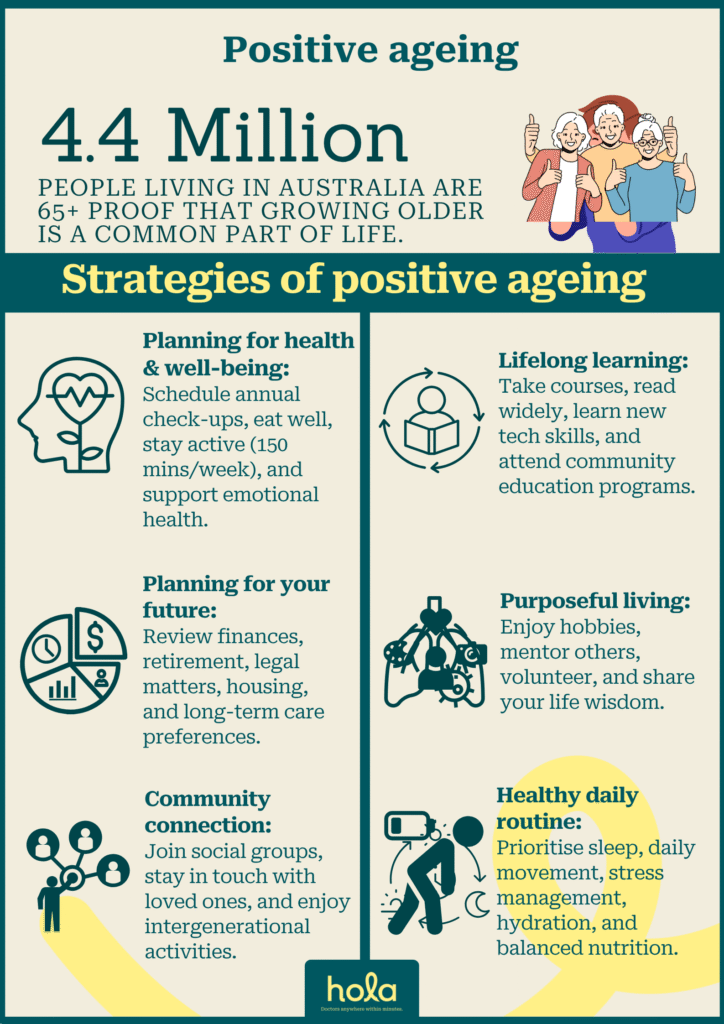Positive ageing: Therapist's approved guide
Written by editorial staff writer at Hola. Medically reviewed by Amira Shah, MA in Counselling Psychology, Registered Psychotherapist.

Contents

Why positive ageing matters:
Ageing is a natural part of life, but how we age can make a huge difference. In Australia, approximately 17.1% of the population, or about 4.4 million people, are 65+—proof that growing older is a common and dynamic part of life. While ageing is often seen as a decline, mental health experts and therapists encourage a more uplifting idea: positive aging. It’s not about resisting time, it’s about embracing who you are, loving where you’ve been, and getting excited about what’s next. Let’s explore how to grow older with strength— Mind, body and spirit.What is positive ageing?
Positive ageing is growing older with a balanced mindset, emphasising health, purpose, and happiness rather than decline or loss. It means accepting ageing as a natural and valuable phase of life—staying mentally alert, emotionally connected, physically active, and open to new opportunities. It’s about living fully at any age, not just gracefully, but energetically.Key aspects of positive ageing
One of the core ideas behind healthy ageing is fostering and encouraging mindsets about getting older and recognising the potential in later stages in life. Here are the key aspects of positive ageing.1. Physical well-being:
- Nutrient-rich diet
- Regular movement
- Prioritising 7-9 hours of sleep
- Preventive healthcare (regular checkups)
2. Mental and emotional health:
- Mindfulness practices (meditation, gratitude journaling)
- Cognitive stimulation (learning new skills, reading) Therapy or support groups for emotional challenges
3. Social connection:
- Weekly social activities (clubs, volunteering)
- Intergenerational relationships (mentoring, family bonds)
- Combating loneliness through regular contact
4. Purpose & growth
- Meaningful hobbies (art, gardening, music)
- Legacy projects (memoirs, teaching skills)
- Helping others (volunteering, community work)
5. Adaptability and resilience:
- Navigating life transitions (retirement, loss)
- Embracing change with flexibility
- Developing coping strategies (therapy, support network)
6. Independence and autonomy
- Leading a self-directed life
- advance care planning (legal/financial prep)
- Staying self-reliant through lifelong learning
Ready for positive change? Start your mental health care plan here.
Why is positive ageing important?
Positive ageing is important because it boosts overall health, improves quality of life, and supports a longer lifespan. By focusing on physical health, mental strength, and meaningful social bonds, individuals can better manage the challenges of ageing. It cultivates a sense of purpose, reduces the risk of depression and isolation, and empowers seniors to lead active, rewarding lives. By focusing on physical vitality, mental agility, and purposeful connections, we transform ageing from a passive process into an active celebration of life’s richness.
Also read: How to deal with negative thoughts: Trusted guide by therapists
Positive ageing examples
Positive ageing is about appreciating life as you get older, nurturing a healthy perspective, and remaining active in ways that provide meaning and enjoyment. Some real-life examples include:
- Lifelong learning: Older individuals who enrol in courses, acquire new skills, or pursue hobbies to keep their minds engaged. E.g. 78-year-old Maria learned Spanish via Duolingo, Retired engineer Raj attends university lectures online.
- Physical Empowerment: Yoga classes adapted for senior with arthritis. “Walking football” leagues for over-65s
- Social innovation: Tech-savvy grandparents hosting family Zoom cook-alongs. Volunteer “grandfriend” program pairing seniors with isolated youth.
- Embracing technology: Learning to navigate smartphones, applications, and social media to stay connected with family and friends.
- Healthy lifestyle: Meal prep groups focusing on anti-inflammatory diets, Sleep hygiene workshops for better rest.
Positive ageing isn’t about perfection—it’s progress over pressure.
Strategy of positive ageing
Positive ageing requires taking proactive, international actions to preserve physical, emotional, and social well-being as you age. It emphasises living a fulfilling life marked by three key pillars: independence, resilience, and a sense of purpose. Here are six evidence-based approaches:
- Planning for your health and mental well-being: Schedule preventive medical check-ups annually, follow a balanced nutrient-rich diet, maintain age-appropriate physical activity (150 mins/week recommended), and practice mindfulness or therapy emotional health.
- Planning for your future: Review financial plans and retirement options, explore housing choices, address legal issues, and research long-term care preferences.
- Community connection maintenance: Volunteer regular in meaningful causes, join social group or clubs, or participating in intergenerational activities. Initiate regular contact with friends/family.
- Lifelong learning: take skill building courses, read diverse materials regularly, master new technologies and attend community education programs.
- Purposeful living: Pursue meaningful hobbies (art, music, gardening), Mentor younger generations, participate in community service, share life experience/knowledge.
- Healthy routines: establish consistent sleep routines, incorporate daily movement, practice stress reduction techniques, maintain hydration and nutrition.
Positive ageing is about making conscious, daily choices that foster independence, engagement, and vitality. Small, consistent actions compound into significant quality-of-life improvements.

The science of happiness in later life
Ageing doesn’t have to signify a decrease in energy or joy. Many individuals discover a deeper happiness and tranquillity as they age. The key is to focus on aspects that bring purpose, connection, and satisfaction.
- Staying socially connected: Maintaining strong bonds with friends, family, and community can help prevent loneliness and enhance emotional well-being.
- Mindset Matters: Rewire for Positivity: Practising gratitude, welcoming change, and letting go of negativity can result in a more hopeful perspective.
- Purposeful Engagement: Fuel for the Soul: Whether through volunteering, engaging in a hobby, or spending quality time with grandchildren, pursuing passions adds joy to everyday life.
- Looking after your health: Regular physical activity, a balanced diet, and adequate sleep significantly impact your emotional and physical well-being.
- Trying new things: Remaining curious and open to fresh experiences can make life engaging and rewarding, even in later years.
Joy in ageing comes from staying involved, connected, and authentic. With the appropriate mindset and lifestyle choices, your later years can be some of your most fulfilling.
Where to get help for mental well-being
Maintaining your mental health is just as crucial as your physical health, and support is available if you're facing challenges or simply wish to enhance your well-being. Starting by consulting your GP can help assess your mental health and connect you with a psychologist or counsellor. Many employers also provide Employee Assistance Programs (EAPs) for confidential support. Community mental health services, support groups, and nonprofit organisations also offer free or low-cost assistance.
Hola Health offers online mental health consultations with licensed professionals for immediate or flexible care. You can talk to someone from the comfort of your home, often with same-day availability.
Aging isn’t about counting the years—it’s about adding meaning to them. With the right mindset, self-compassion, and a sense of purpose, getting older can be one of life’s most enriching journeys. So, embrace your age, live with confidence, and age like a pro!
Take control of your mental health. Begin your care plan now.
What we treat
- Cough
- Nausea & vomiting
- Fever
- Hayfever
- Fatigue
- Sore throat
- Acne
- Hair loss
- Gout
- Eczema
- Rosacea
- Sunburn
- UTI
- Erectile dysfunction
- Contraception
- Morning sickness
- Morning after pill
- Prostate health
- Anxiety
- Depression
- Stress
- Grief & loss
- Antidepressants
- Premature ejaculation
- Asthma
- Blood pressure
- Blood thinners
- Diabetes
- Cholesterol
- Migraines & headaches
- Allergies
- Body ache
- Heartburn & reflux
- Sleep disorder
- Pain relief
- Gastro
Related Articles
Disclaimer
This blog is for general informational purposes only and does not indicate that Hola Health provides all treatments or preventive measures mentioned. It is not intended to be a substitute for professional medical advice. Always seek the guidance of your doctor or other qualified health professional with any questions you may have regarding your health or a medical condition. For emergencies please immediately contact 000. Any medical topics discussed are intended to educate, not to imply availability through Hola Health.

Get affordable healthcare on your terms, with quick access to qualified, Australian-registered telehealth doctors & health practitioners, 24/7, 365 days a year. No more searching for ‘doctors near me‘ – Hola connects you instantly.
Address: 79 St Georges Terrace, Perth WA 6000


Hola Health App
Get affordable healthcare on your terms, with quick access to qualified, Australian-registered telehealth doctors & health practitioners, 24/7, 365 days a year. No more searching for ‘doctors near me‘ – Hola connects you instantly.
Call 000 for emergency or urgent medical help.
Address: 79 St Georges Terrace, Perth WA 6000
© Hola Health, a brand of Packapill Pvt Ltd


 Facebook
Facebook  X
X  Copy Link
Copy Link












